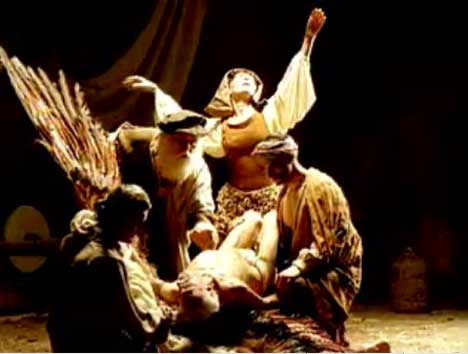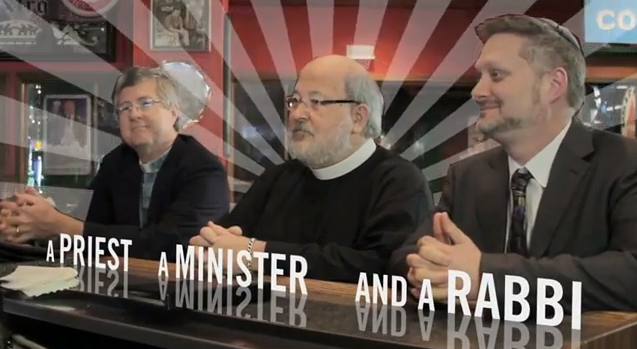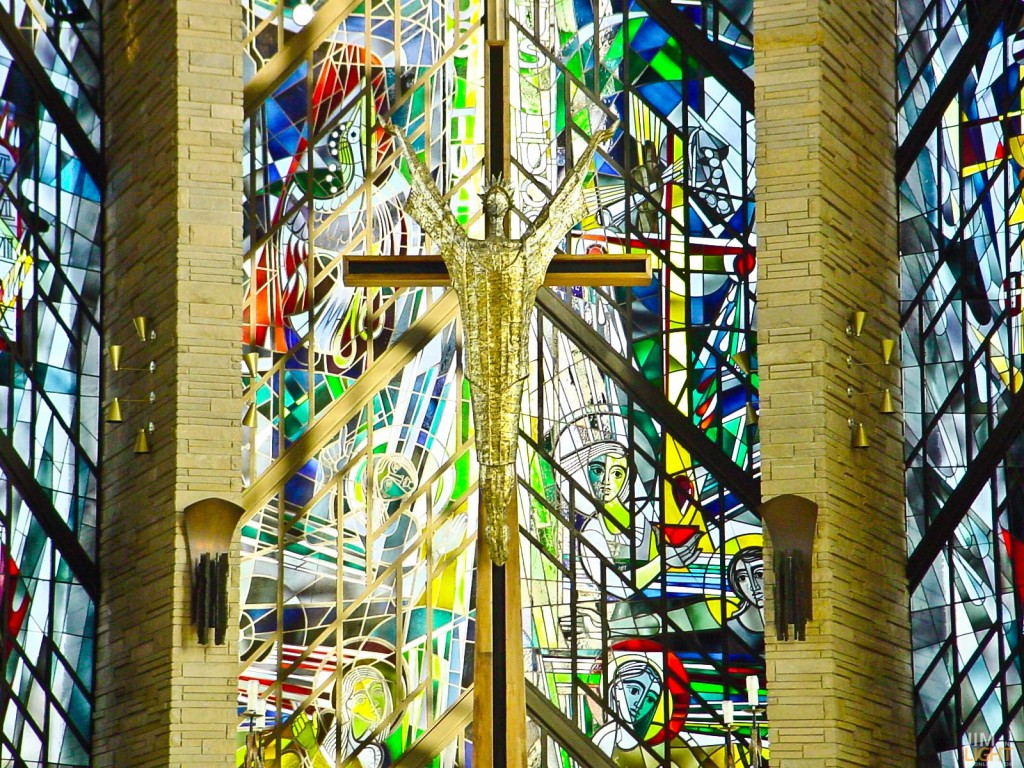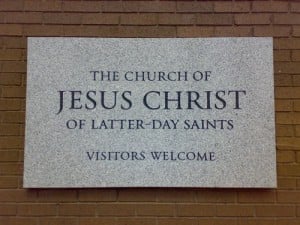That’s me in the corner
That’s me in the spotlight
Losing my religion
Trying to keep up with you
And I don’t know if I can do it
Oh no, I’ve said too much
I haven’t said enough
— “Losing My Religion”, R.E.M.
Recently, Carol Christ and Judith Plaskow engaged in an online conversation at the Feminism and Religion blog over the question of whether or not to remain in the patriarchal religion of one’s birth, with Christ taking the position of the “leave-taker” and Plaskow taking the position of the “reformer-from-within”.
Christ writes that she decided to leave Christianity when she realized that she did not embrace the “core doctrines” of Christianity or its “core symbols” (i.e., God as Lord and King). She writes that, even if she had been able to revision the masculinist language, “the continued repetition of these symbols by others was influencing their individual actions and the actions of the culture they were legitimating through them—and these actions were hurting others”.
Plaskow responds that, while she finds the masculinist language problematic, when she worships with her community, “I do not experience God as king or warrior, and my experience weighs as heavily for me as what you call the core symbols of the tradition.” Christ questions whether Plaskow is concerned about how the image of God as dominating male Other will affect her granddaughter, to which Plaskow responds with this beautiful passage:
“Thinking about my granddaughter puts me in touch with a whole dense network of symbols, other than those most troubling to you, that is central to my experience of Judaism and that I hope will be part of hers. Already at fourteen months, when Hannah (my granddaughter) saw the table set for the Sabbath, she put a kippah (skullcap) on her head and pretended she was singing. True, her father recites the blessing over wine using male God-language, but is that more important than sitting with her family around the table for a relaxed meal, dipping her finger in the wine, or feeling the texture of hallah in her mouth? At her first Passover Seder, she got to see a table laden with symbols, to taste the crumbly matzah and dip parsley in saltwater, combining a taste of spring with the tears of slavery. In a couple of years, she will be able to spill ten drops from the second cup of wine when we name the plagues as an expression of sorrow for the drowning of the Egyptians. In the fall, she will taste apples dipped in honey for a sweet year, hear the blasts of the shofar, and a couple of weeks later sit in our sukkah, decorated with pine needles and laden with fruit and gourds. Certainly, none of these symbols individually is as central as the male God, but together they make a web of sensuous, embodied connections to what it means to be a Jew. She will have at least one grandmother who will talk to her about how God is in all these things and can be thought of as a girl like her and not just as male. She will grow up in a family in which asking critical questions is part of what it means to be Jewish and will be taught to think about the stories and images she is being bequeathed. Do I wish that more Jews used Marcia Falk’s blessings instead of the traditional ones? Yes. Do I see her exposure to male language as something to be discussed with her and questioned? Yes. Would I prefer that she be deprived of all these experiences because of the centrality of male language? Definitely not.“
I am deeply moved by Plaskow’s response, even knowing that her choice was not my own. The power of these symbols shines through Plaskow’s words.
This conversation between Plaskow and Christ closely resembles several conversations that my wife and I had when I left the Mormon church. In fact, the conversation resembles the one I had in my own mind often as I struggled with the question of whether to stay or leave. Every year, the liberal Mormon community that gathers for the Sunstone Symposium and holds a session entitled, “Why I Stay” in which speakers answer that question for themselves. (In fact, the Sunstone community might be defined as those Mormons who recognize that question as one which needs answering.) An anthology of these stories has been also published by Robert Rees. A lot of these stories have to do with the power that the symbols of Mormonism continue to have for these individuals. For example, Joanna Brooks speaks movingly about the symbol of Zion in her interview with Krista Tippett on NPR. I find these stories more moving the older I get. I have no desire to return to the Mormon church, but these stories have caused me to question the narrative that I have been telling myself about my departure from the Church.
Like Christ above, I used to see religion in terms of creed or doctrine. I was convinced that I knew what the “core doctrines” of Mormonism were. And if I could not assent to the articles of faith of the Church, then ipso facto I did not belong there. I wondered if I might do some good by trying to change the Church from within, as a loyal dissenter. But then another voice in my head said I would do more good by petulantly depriving the Church of my talents and energy (similar to John Galt’s strike in Atlas Shrugged).
I took courage to leave from a short story written by Ursula LeGuin, “The Ones Who Walk Away From Omelas”. In LeGuin’s story, Omelas is a paradise that is built on the suffering of an innocent child. People in Omelas are told that the happiness of their paradise depends on the suffering of this child. And most eventually come to terms with it and return to their happy lives. But occasionally one does not. The story ends with the rare the inhabitant walking away toward an unknown future:
“At times one of the adolescent girls or boys who go to see the child does not go home to weep or rage, does not, in fact, go home at all. Sometimes also a man or woman much older falls silent for a day or two, and then leaves home. These people go out into the street, and walk down the street alone. They keep walking, and walk straight out of the city of Omelas, through the beautiful gates. They keep walking across the farmlands of Omelas. Each one goes alone, youth or girl, man or woman. Night falls; the traveler must pass down village streets, between the houses with yellow-lit windows, and on out into the darkness of the fields. Each alone, they go west or north, towards the mountains. They go on. They leave Omelas, they walk ahead into the darkness, and they do not come back. The place they go towards is a place even less imaginable to most of us than the city of happiness. I cannot describe it at all. It is possible that it does not exist. But they seem to know where they are going, the ones who walk away from Omelas.”
At the time, I saw my departure as a grand statement of principle. My exit letter requesting that my name be removed from the Church rolls was 10 pages long, single spaced. And I envisioned myself boldly walking into an unknown future like the leave-takers from Omelas. In retrospect, I think my exit from the Mormon church was less of a choice based on principle, and more of an inevitable result of a growing tension building inside of me — which is perhaps actually more like the people in the Omelas story. What’s interesting about LeGuin’s story is that it is not at all clear that the ones who walk away are in the right. Is there not perhaps a third option? Something between leave-taking and consent to abuse? Might we not attempt to free the child? But what if it is true that the happiness of the community does depend on that child’s suffering. Is the cost to the community justified? Are the people who leave happy? Is there something better than happiness?
In the end, I realize, it was out of necessity, not principle, that I left Mormonism. I could no longer dwell meaningfully in the symbols and the rituals of the LDS Church. The Mormon God had died for me. I felt no community in the Church (I never really had, except when I was on a proselytizing mission in Brazil). And I had begun having strong negative emotional reactions to all things LDS.
When I read Christ’s arguments for leaving Christianity, I hear my own voice. And I can’t help but think that, for her, leaving Christianity may not have been about her rejecting the symbols of Christianity, so much as those symbols losing their power over her. I think that is the difference between Christ and I on the one hand, and Plaskow and my wife on the other. For Plaskow and my wife, the symbols of their respective traditions are still alive to them. When the “core” symbols died for Christ and I, there was nothing left but a corpse, built up of tradition and appeals to authority. But our “core” symbols are not everyone’s “core” symbols, and a symbol may die for one person and not for another. Which is why Christ and I appear to Plaskow and my wife to be throwing the proverbial baby out with the bathwater.
Jung writes that “Only an unparalleled impoverishment of symbolism could enable us to rediscover the gods […] Since the stars have fallen from heaven and our highest symbols have paled, a secret life holds sway in the unconscious.” I remember reading those words — “an unparalleled impoverishment of symbolism” — for the first time and knowing that this is what I had experienced. How it the symbolism became impoverished is a complex story, and not the result of any single decisive moment. I guess my point is that perhaps we have less choice about these matters than we think. Jungians are fond of saying that “we don’t have complexes, they have us”. Perhaps the same could be said of symbols. Perhaps I did not let go of the symbols of Mormonism, so much as they lost their grip on me — for better or for worse. The author of the Epistle to the Hebrews writes that “It is a terrible thing to fall into the hands of the living God.” I can say from experience that it is an equally terrible thing to fall out of the hands of a dead God. I count myself fortunate that other divine hands found me. If nothing else, this question challenges me to recollect with greater humility my “choice” to leave my religion of origin.
















